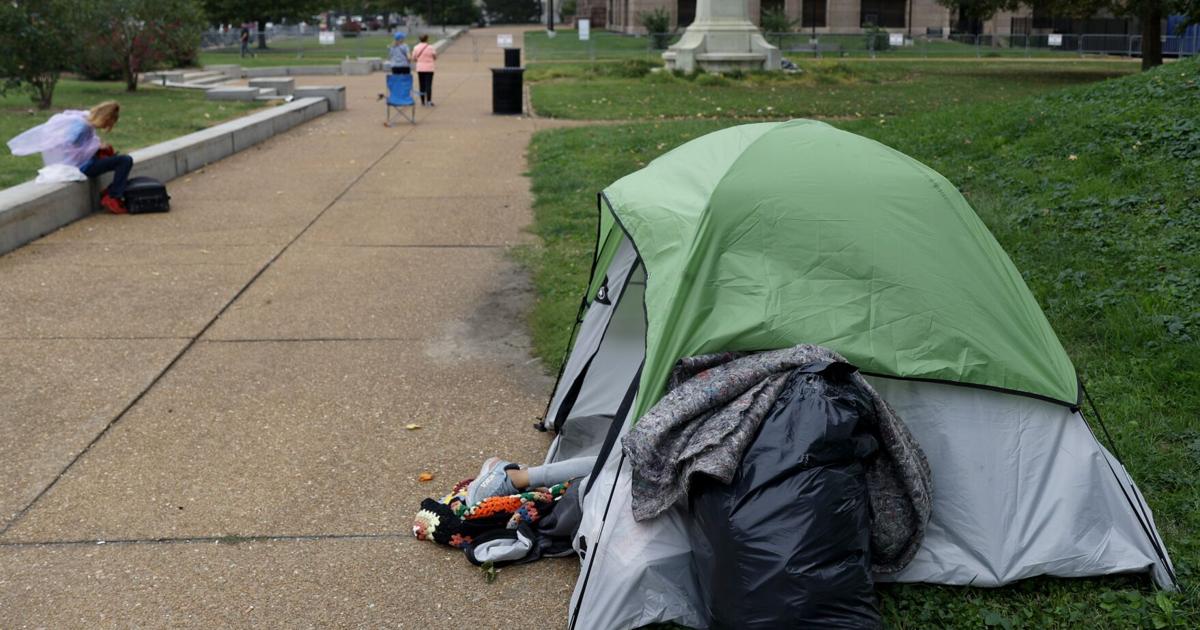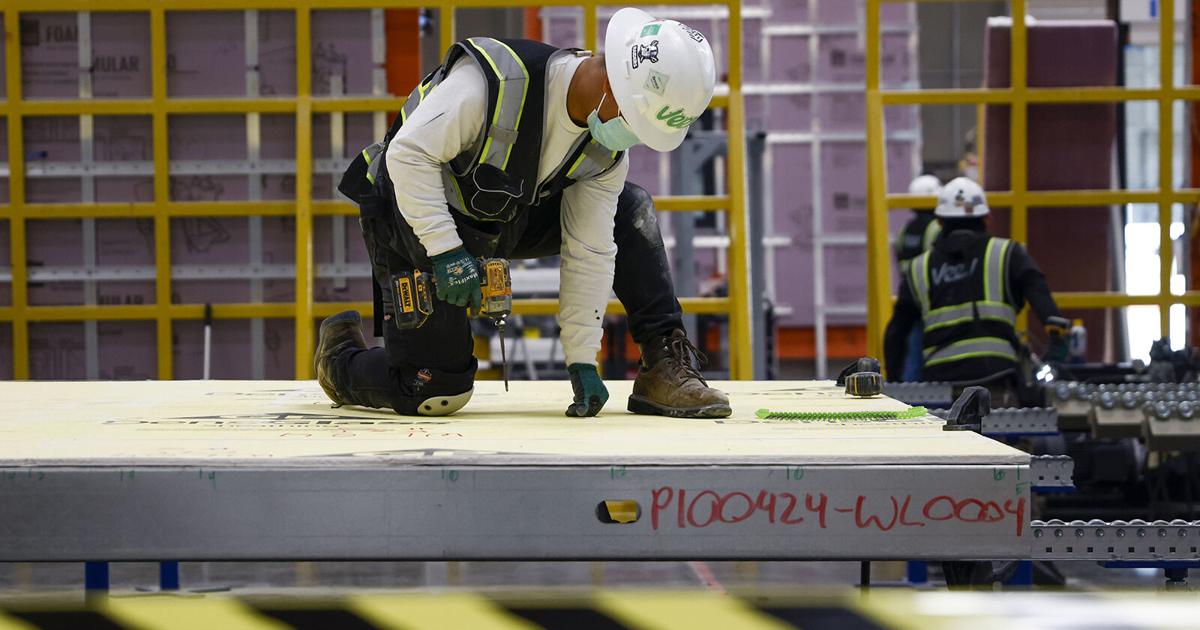Fixing homelessness isn’t so simple as offering a home

By Devon Kurtz
A recent Post-Dispatch editorial suggested a “housing first” solution that seeks to build more free housing while removing accountability measures like mandated drug treatment could help the city manage its growing homelessness crisis. (“
St. Louis’ approach to homelessness clearly isn’t working. Here’s what might.
” Oct. 8.) Yet, mounting evidence shows that housing-first policies fail to address the underlying drivers of chronic homelessness — mental illness and substance abuse. It’s something policymakers are increasingly coming to understand. Similarly, as the public has witnessed and endured the consequences of these quixotic policies, opinion has shifted away from policies that deprioritize and, in many cases, outright ignore the crucial role of mental health and substance abuse treatment in favor of policies that center on accountability, transparency, and long-term outcomes. Housing-first policies do little to help program participants transition to independent and flourishing lives. To make matters worse, the qualifications for housing disincentivize mental health stability, sobriety, and financial well-being. And the housing-first approach isn’t just ineffective — it’s expensive. San Francisco has a $1.1 billion budget that is mainly allotted to permanent housing, in addition to federal funding that flows into the city for the same purpose. Like a line from the famous Eagle’s song, results have been disastrous and even deadly — trapping people in their own devices. An investigation by the San Francisco Chronicle found that despite the program’s high price tag, individuals were living in squalor, with toxic mold, dilapidated ceilings, and rampant crime. Sadly, 166 people overdosed in these hotels between 2020 and 2021. Housing operators who turned a blind eye to dangerous drug use and crime in their housing units never faced any accountability for these failures. Though program proponents claim that “wrap-around services” are a central tenant of their policies, all participation in those services is optional. And there is little transparency into how widely available those services really are. Studies have found that Housing First programs do nothing to reduce criminal activity among homeless people. These cracks in the system have stretched across the country. St. Louis is not immune. Making services and treatment optional for tenants struggling with substance abuse and mental illness is woefully ineffective and carries fatal consequences. A 2021 study by the Urban Institute found that 12% of Denver permanent supportive housing program participants died over three years, compared to 8% in the control group who did not enter the program. The good news is that there is a better way for cities like St. Louis to address this growing crisis. Empowering people to transition out of homelessness through short-term shelters and mental health and substance abuse treatment would help them get a stable footing while building a community of support. A meta-analysis of studies comparing the impact of housing-first programs and recovery programs on substance abuse found that the latter had much more effective outcomes for those looking to rebuild their lives. But accountability and recovery can’t stop there. Those who refuse to take advantage of much-needed services like short-term shelter and treatment services for mental health and substance abuse cannot be allowed to put themselves and others in the community in danger. A vital component of this is removing and cleaning up dangerous tent encampments, as Phoenix has recently done. To do this, policymakers must swiftly address the shortage of temporary shelter space. The creation of sanctioned camping facilities away from residential and business areas is one immediate solution. Sanctioned camps can be monitored by law enforcement and provide sanitation, clean water, and services, creating a safer environment for homeless individuals than city streets. Denver recently took this approach, serving 242 people in 2021 and helping 47 to transition into more stable housing. Despite crime in Denver increasing by 14% during this time, crime in the sanctioned camp actually decreased. Policymakers should consider ways to expand short-term shelter options as well. St. Louis has options and examples of alternatives to housing first that work well in addressing the homelessness crisis. Providing immediate help to individuals on the street is a more compassionate path to sustained independence — and growing research shows the public supports it. Pursuing innovative policies that target the underlying causes of homelessness will help restore communities and the lives of those experiencing homelessness.
People are also reading…
A recent Post-Dispatch editorial suggested a “housing first” solution that seeks to build more free housing while removing accountability measures like mandated drug treatment could help the city manage its growing homelessness crisis. (“St. Louis’ approach to homelessness clearly isn’t working. Here’s what might.” Oct. 8.)
Yet, mounting evidence shows that housing-first policies fail to address the underlying drivers of chronic homelessness — mental illness and substance abuse. It’s something policymakers are increasingly coming to understand.
Similarly, as the public has witnessed and endured the consequences of these quixotic policies, opinion has shifted away from policies that deprioritize and, in many cases, outright ignore the crucial role of mental health and substance abuse treatment in favor of policies that center on accountability, transparency, and long-term outcomes.
Housing-first policies do little to help program participants transition to independent and flourishing lives. To make matters worse, the qualifications for housing disincentivize mental health stability, sobriety, and financial well-being. And the housing-first approach isn’t just ineffective — it’s expensive.
San Francisco has a $1.1 billion budget that is mainly allotted to permanent housing, in addition to federal funding that flows into the city for the same purpose. Like a line from the famous Eagle’s song, results have been disastrous and even deadly — trapping people in their own devices.
An investigation by the San Francisco Chronicle found that despite the program’s high price tag, individuals were living in squalor, with toxic mold, dilapidated ceilings, and rampant crime. Sadly, 166 people overdosed in these hotels between 2020 and 2021.
Housing operators who turned a blind eye to dangerous drug use and crime in their housing units never faced any accountability for these failures. Though program proponents claim that “wrap-around services” are a central tenant of their policies, all participation in those services is optional. And there is little transparency into how widely available those services really are. Studies have found that Housing First programs do nothing to reduce criminal activity among homeless people.
These cracks in the system have stretched across the country. St. Louis is not immune.
Making services and treatment optional for tenants struggling with substance abuse and mental illness is woefully ineffective and carries fatal consequences. A 2021 study by the Urban Institute found that 12% of Denver permanent supportive housing program participants died over three years, compared to 8% in the control group who did not enter the program.
The good news is that there is a better way for cities like St. Louis to address this growing crisis.
Empowering people to transition out of homelessness through short-term shelters and mental health and substance abuse treatment would help them get a stable footing while building a community of support. A meta-analysis of studies comparing the impact of housing-first programs and recovery programs on substance abuse found that the latter had much more effective outcomes for those looking to rebuild their lives.
But accountability and recovery can’t stop there.
Those who refuse to take advantage of much-needed services like short-term shelter and treatment services for mental health and substance abuse cannot be allowed to put themselves and others in the community in danger. A vital component of this is removing and cleaning up dangerous tent encampments, as Phoenix has recently done. To do this, policymakers must swiftly address the shortage of temporary shelter space.
The creation of sanctioned camping facilities away from residential and business areas is one immediate solution. Sanctioned camps can be monitored by law enforcement and provide sanitation, clean water, and services, creating a safer environment for homeless individuals than city streets. Denver recently took this approach, serving 242 people in 2021 and helping 47 to transition into more stable housing. Despite crime in Denver increasing by 14% during this time, crime in the sanctioned camp actually decreased.
Policymakers should consider ways to expand short-term shelter options as well.
St. Louis has options and examples of alternatives to housing first that work well in addressing the homelessness crisis. Providing immediate help to individuals on the street is a more compassionate path to sustained independence — and growing research shows the public supports it. Pursuing innovative policies that target the underlying causes of homelessness will help restore communities and the lives of those experiencing homelessness.
Devon Kurtz is the Director of public safety policy at the Cicero Institute, a public policy organization based in Austin, Texas.
Devon Kurtz is the director of public safety policy at the Cicero Institute, a public policy organization based in Austin, Texas.
Catch the latest in Opinion
Get opinion pieces, letters and editorials sent directly to your inbox weekly!





